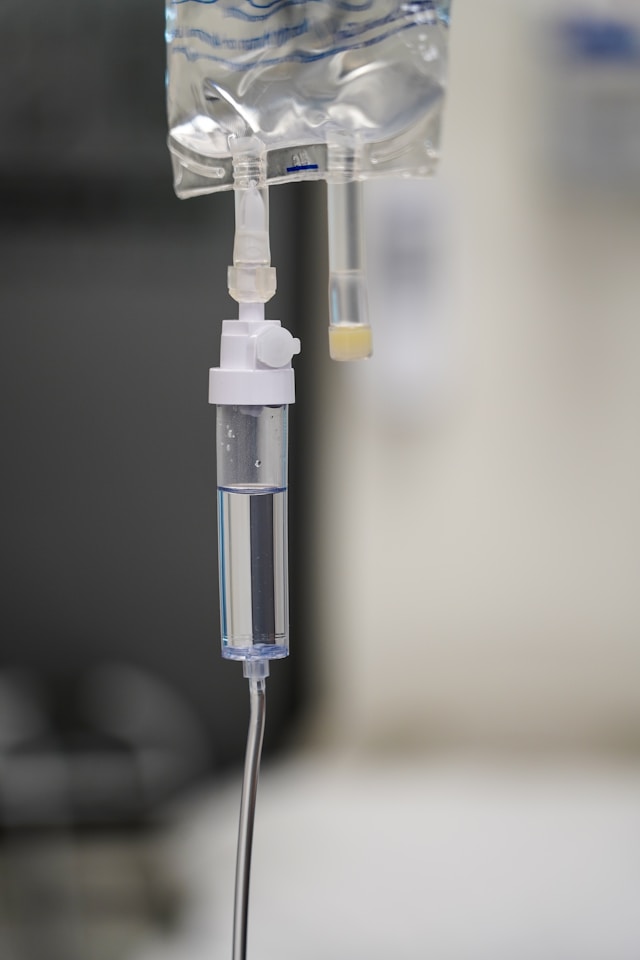
Infusion Centers vs. Hospital Infusions: What's the Difference?


Dr. Chen is a board-certified immunologist with over 15 years of experience treating autoimmune and immunodeficiency disorders. She specializes in IVIG therapy and has published extensively on immune system treatments.
Medical Disclaimer
When your doctor prescribes infusion therapy, one of the first decisions you'll face is where to receive treatment. You have options: hospital-based infusion departments, freestanding infusion centers, or even home infusion services. Each setting offers distinct advantages and considerations, and the right choice depends on your medical needs, personal preferences, insurance coverage, and lifestyle. Understanding the differences between these settings helps you make an informed decision about where you'll feel most comfortable receiving care.
Key Highlights
- Freestanding infusion centers specialize exclusively in infusion therapy and typically offer a more comfortable, efficient experience with shorter wait times and personalized attention.
- Hospital-based infusion provides the security of comprehensive medical resources on-site and may be required by insurance for initial treatments or high-risk medications.
- Home infusion brings treatment directly to you with a dedicated nurse, offering maximum convenience and privacy for eligible patients and medications.
What Are Freestanding Infusion Centers
Freestanding infusion centers (also called ambulatory infusion centers or infusion clinics) are healthcare facilities dedicated specifically to administering infusion therapy. Unlike hospital departments that serve many purposes, these centers focus exclusively on outpatient infusion services.
These facilities are designed with patient comfort in mind, typically featuring comfortable recliners, a calming atmosphere, amenities like blankets and refreshments, and private or semi-private treatment bays. The nursing staff specializes in infusion therapy and develops expertise in managing the specific medications and conditions they treat regularly.
According to the National Home Infusion Association, the growth of specialized infusion centers reflects a shift toward more patient-centered, efficient outpatient care for chronic conditions requiring ongoing infusion therapy.
Freestanding centers can be independent businesses, owned by healthcare systems, or part of larger specialty pharmacy organizations. They must meet the same safety and accreditation standards as hospital-based infusion services.
Hospital-Based Infusion Departments
Hospital infusion departments are located within or adjacent to hospitals, operating as outpatient services within the larger hospital system. These departments serve patients who need infusion therapy but don't require hospital admission.
Hospital-based infusion tends to be more clinical in atmosphere, with medical equipment and settings similar to other hospital departments. Staffing often includes nurses who work across various hospital departments rather than focusing exclusively on infusion therapy, though many hospitals do have infusion specialists on staff.
The primary advantage of hospital-based infusion is immediate access to comprehensive medical resources if complications arise. Emergency equipment, laboratory services, physician specialists, and intensive care capabilities are readily available if needed.
Key Differences Between Infusion Centers and Hospitals
Understanding how these settings differ helps you choose the right option for your situation:
Atmosphere and Comfort: Freestanding infusion centers are typically designed to feel less clinical and more welcoming. They often have living room-style furniture, softer lighting, and a spa-like ambiance. Some offer amenities like entertainment systems, Wi-Fi, gourmet snacks, and even massage chairs. Hospital infusion departments, while comfortable, tend to have a more traditional medical environment with standard hospital furniture and decor.
Wait Times and Efficiency: Infusion centers generally have shorter wait times and more predictable scheduling since infusion is their sole focus. Appointments rarely run behind schedule, and the check-in process is streamlined. Hospital departments may experience delays due to emergency cases, shared resources, or coordination with other hospital services. According to Cleveland Clinic research, patient satisfaction scores for freestanding centers often exceed those of hospital-based services, with wait time being a significant factor.
Nursing Staff and Specialization: Infusion center nurses typically specialize exclusively in infusion therapy, developing deep expertise in specific medications and conditions. They often see the same patients repeatedly, building relationships and familiarity with individual needs. Hospital nurses may be cross-trained across multiple departments and might not see the same patients consistently.
Cost Considerations: Freestanding centers often have lower facility fees than hospitals, which can significantly reduce your out-of-pocket costs depending on your insurance plan. Hospital facility fees include overhead for maintaining comprehensive emergency services and 24/7 operations, even for routine outpatient infusions. Some insurance plans incentivize using freestanding centers through lower copays.
Convenience and Accessibility: Infusion centers are often located in more convenient suburban locations with easy parking and simple navigation. Hospitals typically require navigating large campuses, parking structures, and complex building layouts to reach the infusion department.
Available Services: Hospitals offer immediate access to diagnostic services (labs, imaging), specialist consultations, and emergency care if needed during your infusion. Freestanding centers have emergency protocols and equipment but rely on 911 and hospital transfer for serious complications.
Treatment of Complex Cases: For complex medical conditions, first-time infusions of higher-risk medications, or patients with multiple comorbidities, hospitals may be preferred or required by insurance. Once stability is established, patients often transition to infusion centers for ongoing maintenance therapy.
When Hospital-Based Infusion Makes Sense
Certain situations make hospital-based infusion the appropriate or necessary choice:
First-Time Infusions: Insurance companies often require initial infusions of new medications to occur in a hospital setting where comprehensive monitoring and emergency response are immediately available. After you've tolerated several treatments successfully, you may be approved to switch to an infusion center.
High-Risk Medications: Some medications carry higher risks of serious infusion reactions and may require hospital administration indefinitely. Your doctor and insurance company will determine if this applies to your treatment.
Complex Medical History: Patients with multiple serious medical conditions, unstable health status, or recent hospitalizations may need the additional monitoring and resources available in a hospital setting.
Comfort and Reassurance: Some patients simply feel more secure receiving treatment in a hospital environment, knowing that comprehensive medical care is immediately available if needed. This peace of mind is valid and important for your overall treatment experience.
Insurance Requirements: Your insurance plan may designate certain hospitals as preferred or required providers, making hospital-based infusion the most cost-effective option for you.
Coordination with Other Services: If you regularly see specialists at a particular hospital or need frequent lab work and imaging, receiving infusion therapy at the same location may be more convenient.
When Infusion Centers Are Ideal
For many patients, freestanding infusion centers offer the optimal combination of quality care, comfort, and convenience:
Established Treatment Regimens: Once you've demonstrated good tolerance to your medication through initial infusions, transitioning to an infusion center often makes sense for ongoing maintenance therapy.
Preference for Specialized Care: Patients who value building relationships with specialized nursing staff and prefer a less clinical environment often find infusion centers more appealing.
Convenience and Efficiency: If you have work or family obligations that make long wait times or complex hospital navigation difficult, infusion centers' streamlined processes may fit your life better.
Cost Savings: When insurance covers both options, choosing an infusion center may result in lower out-of-pocket costs due to reduced facility fees.
Routine Treatments: For straightforward infusion regimens without complicated medical issues, infusion centers provide excellent care in a more comfortable setting.
Chronic Condition Management: Patients with ongoing autoimmune, neurologic, or other chronic conditions who need regular infusions for months or years often prefer the consistency and personalized attention that infusion centers provide.
Home Infusion: A Third Option
Home infusion services bring infusion therapy directly to your home, offering a completely different experience from clinic or hospital-based treatment:
Maximum Convenience: You receive treatment in your own home without any travel, parking, or navigating medical facilities. This is particularly valuable for patients with mobility challenges, those who are immunocompromised and want to minimize exposure to public spaces, or anyone with scheduling constraints that make clinic visits difficult.
Personalized Care: Home infusion nurses typically see the same patients for each visit, building strong therapeutic relationships. You receive one-on-one attention throughout your entire treatment without the presence of other patients.
Privacy and Comfort: Being in your own space with your own belongings, entertainment, and food provides unmatched comfort. You can wear whatever you want, adjust your environment to your preferences, and have family around without visitor restrictions.
Eligibility Considerations: Not all medications are appropriate for home infusion, and insurance approval is required. You must have a safe, clean environment for infusion and typically need someone present during treatment. Home infusion companies evaluate whether your situation is appropriate for home-based care.
Safety Protocols: Home infusion nurses are specially trained, carry emergency equipment and medications, and have protocols for contacting emergency services or medical teams if complications arise. The National Home Infusion Association maintains rigorous standards for home infusion safety and quality.
How to Choose the Right Setting for You
Consider these factors when deciding where to receive infusion therapy:
Talk to Your Doctor: Your healthcare provider can recommend the most appropriate setting based on your medical condition, medication, and overall health status. They know which settings are safest and most suitable for your specific situation.
Check Insurance Coverage: Understand which options your insurance covers and what your out-of-pocket costs will be in each setting. Some plans have restrictions or financial incentives that make one option clearly more affordable.
Visit Potential Locations: If possible, tour infusion centers or hospital departments before committing. See the environment, meet staff, and get a feel for which setting makes you most comfortable.
Consider Logistics: Think practically about location, parking, drive time, and how infusion appointments will fit into your schedule. The most convenient location may help you maintain consistency with treatment.
Evaluate Your Priorities: Decide what matters most to you—comprehensive hospital resources, specialized center comfort, or home convenience—and let that guide your choice.
Start Conservative, Then Adjust: Beginning with hospital-based infusion for initial treatments and transitioning to an infusion center or home infusion once you've established tolerance is a common and sensible approach.
You Can Switch Settings If Needed
Remember that your initial choice isn't permanent. Many patients start in a hospital setting for safety and reassurance, then transition to an infusion center for ongoing treatments once they've established tolerance. Others try an infusion center but decide they prefer hospital-based care. Some eventually move to home infusion after successful treatment history.
If you're unhappy with your current infusion location, talk to your doctor about alternatives. Insurance approval may be needed to switch settings, but changes are common and generally supported if medically appropriate.
Frequently Asked Questions
Are infusion centers as safe as hospitals?
Yes, accredited infusion centers meet the same safety and quality standards as hospital-based infusion services. They employ specialized infusion nurses, maintain emergency equipment and protocols, and have systems for rapid transfer to emergency care if needed. Serious complications requiring hospital-level intervention are rare during infusion therapy. For routine maintenance infusions of established medications, infusion centers provide excellent, safe care.
Is infusion therapy cheaper at an infusion center or hospital?
Infusion therapy at freestanding centers typically costs less than hospital-based infusion because facility fees are lower. However, your actual out-of-pocket cost depends on your insurance plan's cost-sharing structure. Some patients pay the same copay regardless of location, while others pay significantly more at hospitals due to higher coinsurance amounts. Check with your insurance to understand your specific costs in each setting.
Can I switch from hospital infusions to an infusion center?
Yes, many patients transition from hospital-based infusion to freestanding centers after establishing tolerance to their medication through initial treatments. This switch requires your doctor's approval and insurance authorization. The transition is common and supported when you've demonstrated stable tolerance and don't require hospital-level monitoring. Talk to your healthcare provider about whether switching is appropriate for your situation.
What is home infusion and who qualifies?
Home infusion is infusion therapy administered in your home by a specialized nurse who travels to you. Patients who qualify typically have stable conditions, have tolerated their medication well through multiple clinic infusions, can provide a clean and safe home environment, and have someone present during treatment. Not all medications are approved for home administration, and insurance must authorize home infusion services. Your doctor can determine if you're a candidate.
Do infusion centers treat all conditions?
Most infusion centers treat a wide range of conditions including autoimmune disorders (rheumatoid arthritis, Crohn's disease, ulcerative colitis, lupus), neurologic conditions (multiple sclerosis, CIDP, myasthenia gravis, migraines), immune deficiencies, iron deficiency anemia, and osteoporosis. However, infusion centers typically don't provide chemotherapy for cancer treatment. Each center has specific medications and conditions they're equipped to treat, so verify that your specific treatment is available at your chosen location.
Find the Right Setting for Your Infusion Therapy
The best infusion setting is the one where you feel comfortable, safe, and can maintain consistent treatment. Whether that's a hospital department, specialized infusion center, or your own home, quality care is available in each setting.
Ready to explore your options? Compare infusion centers, hospital programs, and home infusion services near you to find the right fit for your treatment needs.
Medical Disclaimer: This content is for educational purposes only and is not a substitute for professional medical advice, diagnosis, or treatment. Always consult your healthcare provider with questions about your medical condition or treatment options.
Article Statistics


Table of Contents
Article Statistics










